[Video] How Henan’s Pang Dong Lai supermarket continues to thrive in China’s sluggish market
Amid a sluggish consumer spending environment in China, Pang Dong Lai supermarket chain in Henan has bucked the trend and even became a popular tourist attraction. Lianhe Zaobao Beijing correspondent Sim Tze Wei speaks with locals to uncover the secrets behind the thriving business.
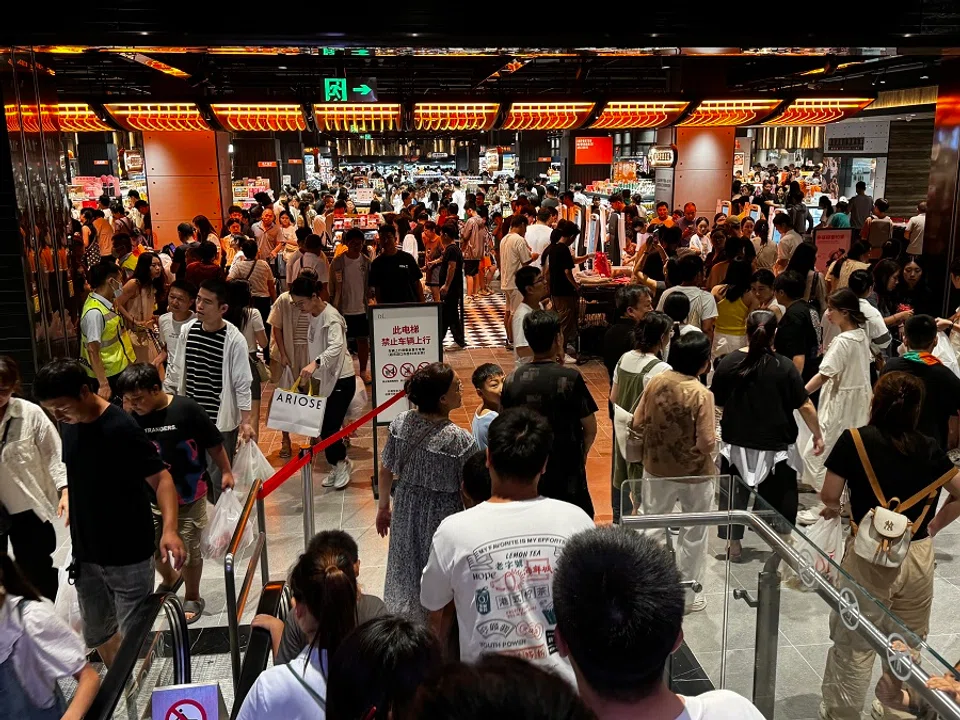
(Photos: Sim Tze Wei/SPH Media, unless otherwise stated.)
In today’s sluggish Chinese consumer market, it is hard to believe that a supermarket in a fourth-tier city could become so popular.
People are already waiting at the entrance even before the shopping mall opens. Within ten minutes of entering the supermarket, a young boy is asking to borrow your phone to contact his parents because he got lost in the sea of people. The massive crowd made it incredibly difficult to manoeuvre, forcing customers at the busiest bread section to raise their shopping baskets above their heads just to move around.
I visited the Pang Dong Lai (胖东来) Angel City supermarket in Xuchang, Henan, on a Friday afternoon and again on Saturday and Sunday mornings in early August. The crowd was constant, a sight I’ve never seen in supermarkets in Beijing.
For over two decades, Pang Dong Lai has operated on a model that allows customers to return any item they are dissatisfied with. This reverse marketing strategy did not incur any losses...
Treating customers like God
Nearly all the Xuchang residents I came across took pride in Pang Dong Lai, describing it as a “supermarket that treats customers like God” and one that “isn’t just doing business but realising a philosophy”.
How does Pang Dong Lai treat its customers like God? Ride-hailing driver Zheng told me, “You can return the clothes and shoes you bought if you don’t like them. As long as it is within the time limit, you can return anything.” If you are dissatisfied with a movie you watched at a Pang Dong Lai cinema, you could even request a refund within 20 minutes of the movie ending and get back 50% of the ticket price.
For over two decades, Pang Dong Lai has operated on a model that allows customers to return any item they are dissatisfied with. This reverse marketing strategy did not incur any losses, but instead attracted and retained customers for the company, fostering trust and reliance on the brand and turning them into followers of the “Pang Dong Lai sect”.
Ride-hailing driver Zhang hit the nail on the head when he said, “The more they don’t want to earn money, the more they actually make. My family spends most of our money there.”
What philosophy does Pang Dong Lai want to realise? The answer is in the mall’s slogan: Freedom and love. This is Pang Dong Lai’s corporate culture, and also a belief that founder Yu Donglai upholds.
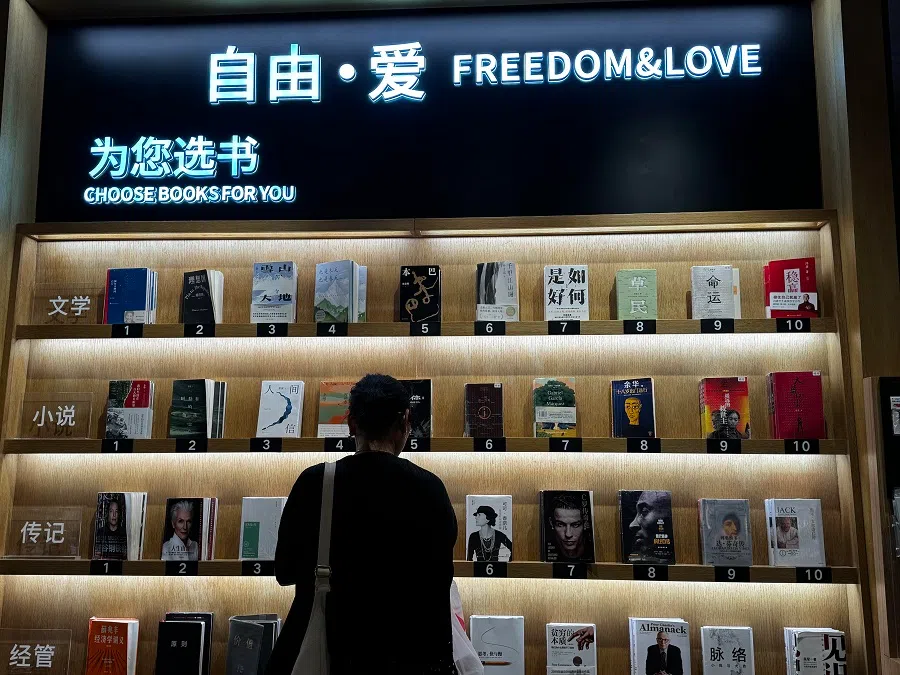
Born in Xuchang, Henan, 58-year-old Yu founded Pang Dong Lai’s predecessor Wang Yue Lou Pang Zi Dian (望月楼胖子店) in 1995. After several twists and turns, the store has now grown into a leading corporation in Xuchang. There are currently 12 Pang Dong Lai stores in Xuchang, and two in Xinxiang, a third-tier city in Henan. The latest one is the internet-famous branch at Angel City in Xuchang, which opened in 2023.
A Pang Dong Lai employee told Lianhe Zaobao that the company’s management team does not accept media interviews, nor does the company advertise itself. However, the internet-famous store at Angel City attracted a huge number of internet celebrities who then posted videos on social media, creating a huge publicity effect that helped Pang Dong Lai gain widespread popularity across China over the past few years.
The Pang Dong Lai employee also said that hundreds of enterprises visit the supermarket each day to learn from their practices. One study group member, who was listening to a tour guide through headphones, shared that the industry management association from Hangzhou, where he works, organised the visit to gain insights due to the weak performance of the Chinese economy in recent years.
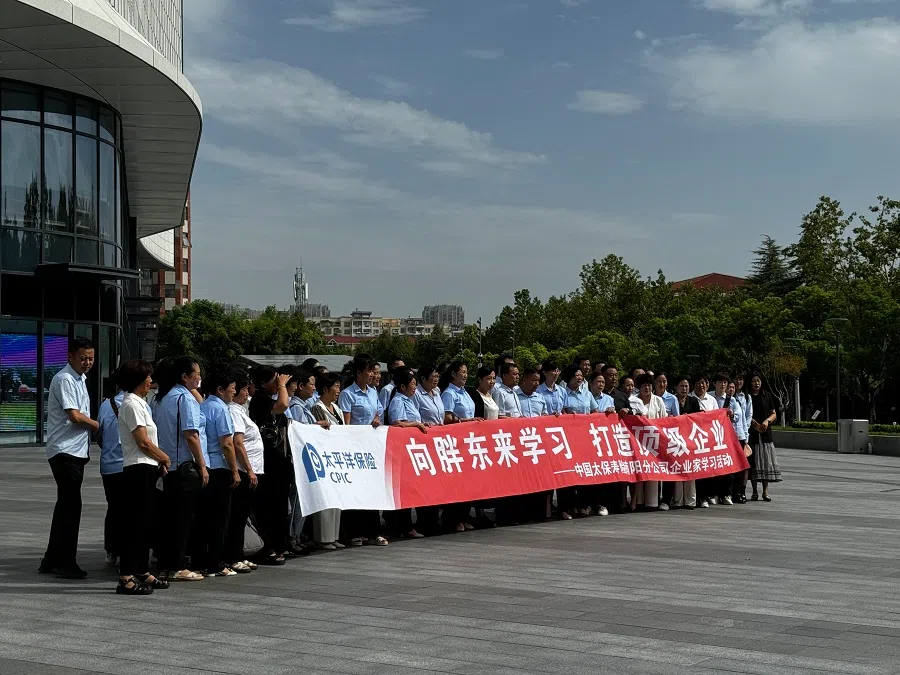
What did he learn? He laughed and shared, “They repeatedly stressed the importance of freedom and love, as well as sincerity.”
While many industries in China face intense competition and harsh price wars, Pang Dong Lai distinguishes itself by pursuing breakthroughs in a different way.
The supermarkets are well-stocked, with numerous foreign brands. Prices of some products are not low either, with some even more expensive than other supermarkets by 20%. For example, a large supermarket sells peaches at 3.99 RMB (US$0.56) per 500 grams, but Pang Dong Lai sells them at 5.50 RMB. Oysters are sold at 3.90 RMB at another supermarket but 5.50 RMB at Pang Dong Lai.
But not even the best service can beat food safety, a knife hanging over the heads of the Chinese. With a general lack of trust, most Xuchang and Xinxiang residents have entrusted their family’s health to Pang Dong Lai.
Focus on customer service and food safety
Pang Dong Lai does not engage in price wars but focuses on customer service experience and quality. Zhang, a purchasing agent (代购 daigou), said, “They’ve thought of everything to meet the customers’ needs.”
Pet lockers are located inside the supermarket and outside the mall. There are also storage lockers inside the mall for customers to put their belongings. The supermarket offers six types of shopping carts to accommodate different needs. Posters teach you how to choose, store, process and cook their products; and moulds are displayed to help you differentiate cake sizes. The pesticide residue sampling and testing figures, as well as the sweetness of fruits and vegetables, are also shown. The cost and selling price of products are also indicated on the price tags.
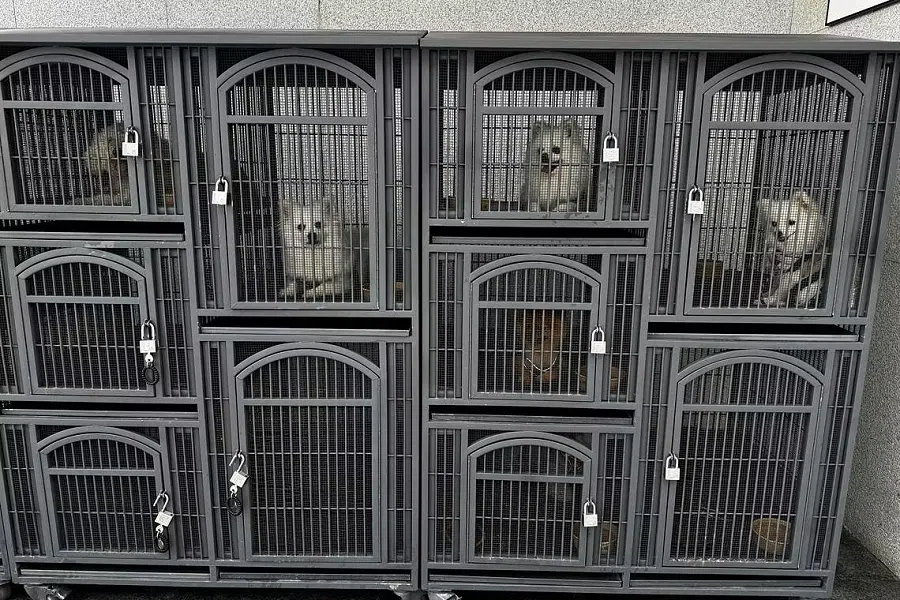
Furthermore, water dispensers are available at the public area, while the restrooms are equipped with combs, cotton buds and hand creams. Customers can complain if they find the cooked food unsatisfactory. Magnifying and reading glasses are available at the pharmacy for the elderly to use.
But not even the best service can beat food safety, a knife hanging over the heads of the Chinese. With a general lack of trust, most Xuchang and Xinxiang residents have entrusted their family’s health to Pang Dong Lai.
Xinxiang resident Bu Xiaoqing, 21, told me that her mother has told her since she was a child that although Pang Dong Lai’s products are slightly more expensive, “the money is spent with peace of mind”.
Purchasing agent Zhang said, “There’s nothing iffy about their products.”
Ride-hailing driver Wang illustrated his point with garlic chives: Pang Dong Lai does not sell garlic chives because they seldom meet pesticide residue limits.
Indeed, I could not find garlic chives at several Pang Dong Lai supermarkets.
A sales staff said, “We haven’t sold it for a long time. The quality is poor.”
... customers are there to buy peace of mind. After the recent incident involving the alleged use of fuel tanker trucks to transport cooking oil in China, Pang Dong Lai’s own brand of cooking oil flew off the shelves.
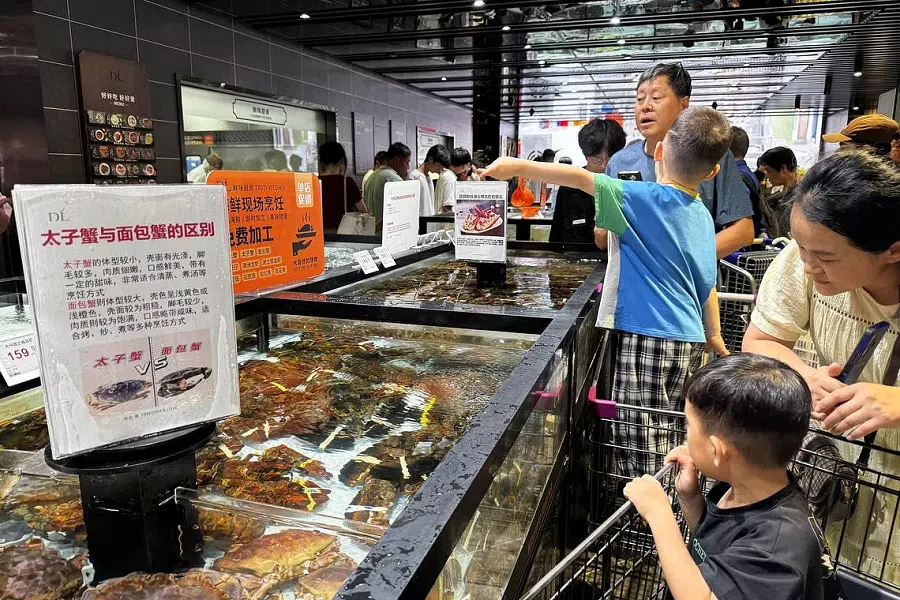
Put bluntly, customers are there to buy peace of mind. After the recent incident involving the alleged use of fuel tanker trucks to transport cooking oil in China, Pang Dong Lai’s own brand of cooking oil flew off the shelves. But what Xuchang residents are incessantly talking about is that Pang Dong Lai spent nearly nine million RMB to compensate customers following complaints of an unsanitary food processing environment for rolling dough.
A netizen had posted a video on 25 June claiming that the food processing environment for rolling dough at a Pang Dong Lai branch in Xinxiang was unsanitary. Company investigations confirmed that the complaint was justified, and the whistleblower was given a cash reward of 100,000 RMB. Every customer who bought rolling dough and spicy noodles at the two catering departments of Pang Dong Lai’s Xinxiang branch were also refunded and given 1,000 RMB in compensation. This cost Pang Dong Lai over 8.8 million RMB.
Pang Dong Lai is turning the tides amid China’s bleak retail outlook. Founder Yu Donglai said on a we-media platform that Pang Dong Lai made a net profit of 140 million RMB last year, surpassing retail giants such as Yonghui and Sun Art.
Yu insists on distributing more of the company’s profits to its employees. He claimed that the monthly salary of employees is at least 7,000 RMB, with most generally earning over 8,000 RMB a month. However, Yu has high expectations of his employees. He stressed that they must be focused and fully dedicated at work, or “leave if they can’t do it”.
A sales staff at Pang Dong Lai Angel City told me that the supermarket chain indeed offers a salary two to three times higher than other supermarkets. In addition to closing on Tuesdays, it offers 30 days of annual leave and ten days of “unhappy leave”...
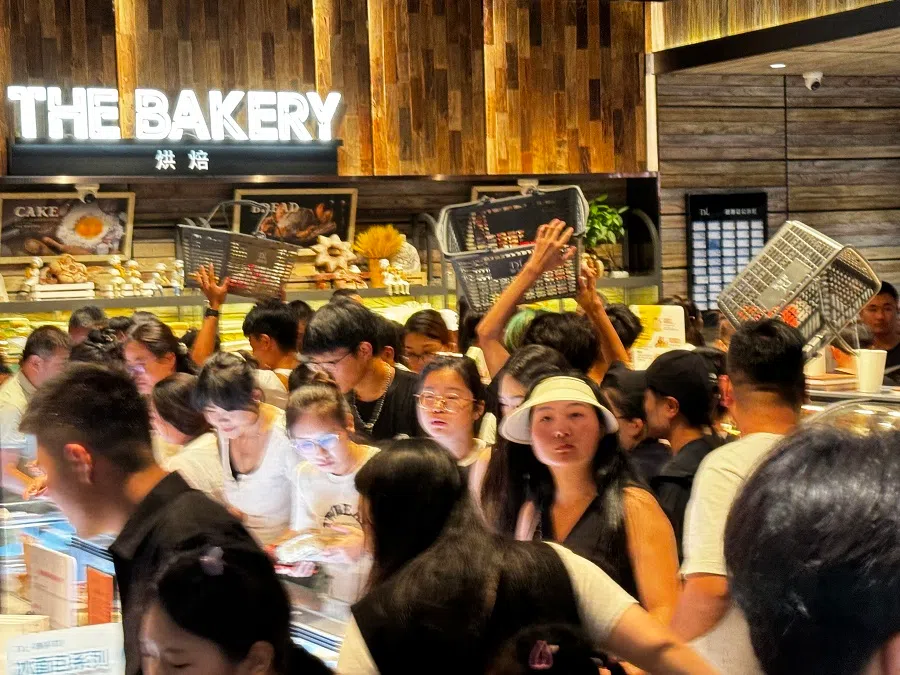
A sales staff at Pang Dong Lai Angel City told me that the supermarket chain indeed offers a salary two to three times higher than other supermarkets. In addition to closing on Tuesdays, it offers 30 days of annual leave and ten days of “unhappy leave”, making a total of 40 days off.
You can go on leave just because you’re unhappy? “Yes, just tell your supervisor in advance,” the employee said.
Difficulty expanding beyond Henan
In the nearly 30 years since it was founded, Pang Dong Lai has always been rooted in Xuchang, only going as far as Xinxiang — not even venturing into Zhengzhou, the capital of Henan.
With China’s economy in the doldrums, people are generally hesitant to spend money. During the Spring Festival this year, per capita tourism consumption was down 9.5% compared with the same period in 2019, a further decrease from the 2.5% recorded during China’s national day holidays in 2023.
Many Chinese economists have called on the government to issue consumption vouchers to spur consumption and save the economy. Can the widely popular and crowd-drawing Pang Dong Lai model be replicated in other cities to drive consumption?
The Hangzhou study group member said that Pang Dong Lai’s limitations and advantages are grounded in the fact that it is based in a fourth-tier city. “If it opened in Hangzhou or Shanghai, it would face competition from several major supermarkets, which could lead to a dilution of their customer base,” he assessed.
Renowned Chinese economist Pan Heling pointed out to Lianhe Zaobao that Henan has a relatively high population density, and the cost for opening a supermarket there is lower compared with the southeastern coastal regions and first- and second-tier cities. The difference in the consumption environment in the different areas of China meant that Pang Dong Lai’s model might not be successful outside Henan.
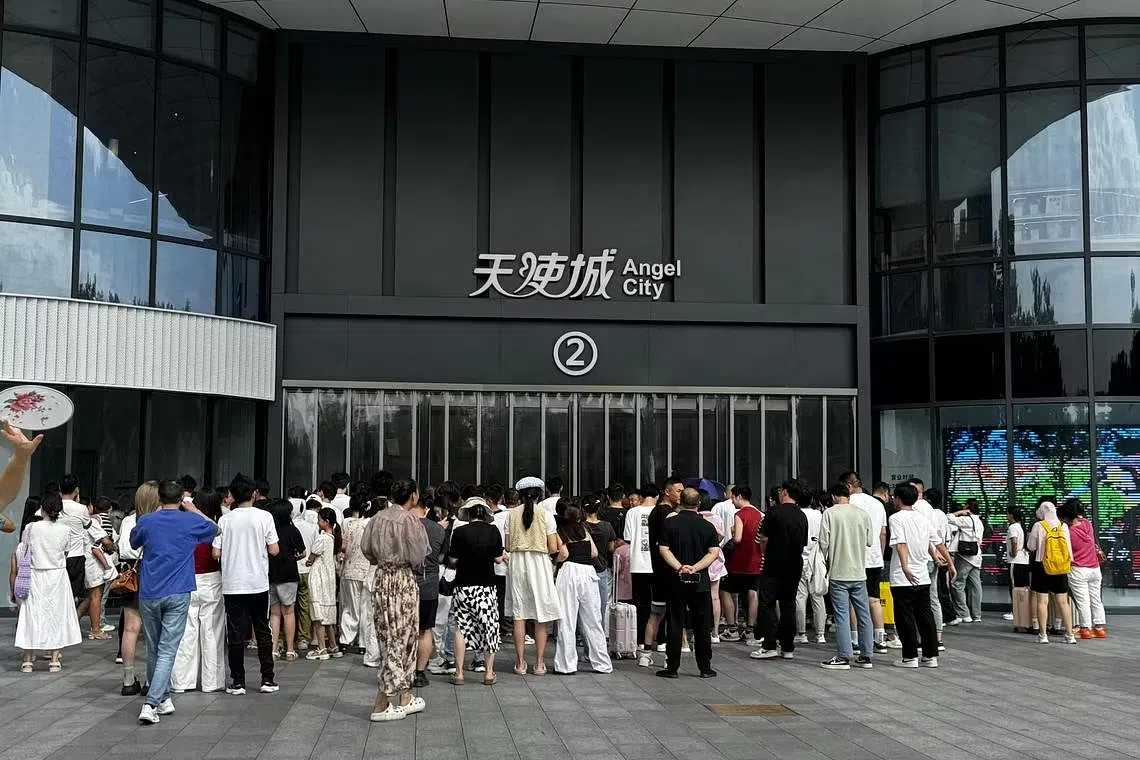
Most Pang Dong Lai properties in Xuchang are owned by the business, which saves on rental costs. It also owns an industrial logistics park and a production facility, which makes it convenient for the production and transportation of some of their private label products. These advantages would be lost outside Xuchang.
Becoming a local attraction
Cui Lili, a professor at the Department of Information Management and E-Commerce and director of the E-Commerce Research Institute at Shanghai University of Finance and Economics, opined that the fact that Pang Dong Lai did not venture out of Henan cannot be attributed entirely to the localisation of the supply chain.
After Pang Dong Lai’s ascent, not only did it become the city’s calling card, it was also playfully labelled by netizens as a “6A tourist attraction with no off-season”.
She told Lianhe Zaobao that it is more likely that due to Pang Dong Lai’s focus on service and providing the best experience for consumers, it has formed a reliance on some local production factors in its operations, such as cost, employee relations and corporate culture.
Before Pang Dong Lai’s popularity boom, wigs were the most well-known local product from Xuchang. It is said that for every ten wigs globally, six are produced in Xuchang. After Pang Dong Lai’s ascent, not only did it become the city’s calling card, it was also playfully labelled by netizens as a “6A tourist attraction with no off-season”.
Take for instance the eight-day Spring Festival holidays this year, roughly 1.273 million visitors in total toured the eleven 4A tourist attractions in Xuchang, while the three Pang Dong Lai supermarkets accumulated 1.163 million shoppers in just three days.
At Pang Dong Lai Angel City’s car park, I saw cars from as far north as Liaoning, and as far south as Guangzhou. The hotel I stayed at had a guide for shopping at Pang Dong Lai on display as soon as the television was switched on. Did the hotel collaborate with Pang Dong Lai? The lobby staff said no, but because the hotel guests all asked about the supermarket, they decided they might as well make a guide.

This is how it is when a supermarket places an entire city on the map.
Purchasing agents and scalpers draw controversy
I met purchasing agent Zhang right outside the tea leaves section at Pang Dong Lai Angel City. She was peddling tea leaves at 100 RMB a pack, 10 RMB more than the sticker price — if one buys in bulk from her, the price difference is waived.
When I declined her offer, Zhang responded warmly, “Feel free to find me anytime. I’m here every day.”
Pang Dong Lai not only brought fame to Xuchang, it also provided a business opportunity for purchasing agents like Zhang and a large group of scalpers.
Scalpers are especially focused on Pang Dong Lai’s beers. Nearly all the ride-hailing drivers remark that a carton of beer from Pang Dong Lai is a guaranteed profit. Ride-hailing driver Bi said, “You can give it a shot. Walk out with a carton of beer, and someone would offer to buy it from you for 10 RMB or 20 RMB on top of what you paid, then resell it for an additional 30 RMB or 40 RMB.”
Pang Dong Lai beers are available for online pre-orders from 9.30 am and can be picked up in-store later. I gave up after trying for two days; either the webpage refused to load or the beers would already be sold out. This is a game only scalpers and those with plenty of free time can win. Zhang mentioned that she could not secure a pre-order after four months of trying.
Meanwhile, on Xiaohongshu one can easily see several offers of “Pang Dong Lai gopher” services, charging 10 RMB commission for products that cost 100-200 RMB, 15 RMB for products that cost 200-300 RMB, and so on.
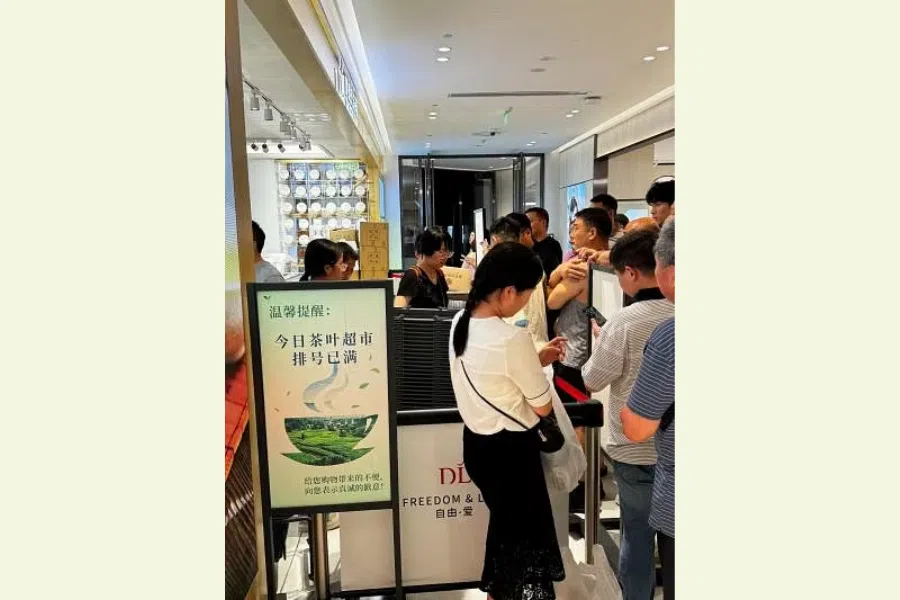
Scalpers are charging 80-90 RMB for a 45 RMB carton of beer. On Douyin, some netizens have criticised the store for allowing purchasing agents and scalpers to thrive.
Given that it is hard to separate purchasing agents and scalpers from regular customers, concerns have been raised about protecting consumer rights. Some netizens have responded by stating, “I refuse to buy as long as the purchasing agents are still around.”
On 18 August, Pang Dong Lai issued a letter apologising to customers for the issues caused by a surge of purchasing agents and scalpers reselling popular products and pre-order slots at a premium. It promised to make improvements in a more scientific and efficient manner.
I did not manage to snag beers, but I did try to buy tea leaves joining the online queue. To my surprise, there were 400 people ahead of me and I had to wait until 1pm for my turn to enter the supermarket. It makes you wonder how many of those 400 people were purchasing agents or scalpers.
Yu Donglai: Entrepreneur-preacher
The people of Xuchang have a saying: the old capital of Cao Wei produced two legendary figures, one was called Cao Cao and the other is Yu Donglai.
Who is Yu Donglai?
He is the founder of Xuchang’s Pang Dong Lai, and his employees call him “Big brother Donglai” or “Big brother Yu”. Ride-hailing driver Zheng said that Yu dresses simply and does not put up airs. One can even see him directing traffic in the supermarket, and “won’t be able to tell that he is the boss”.
In 1998, a devastating fire destroyed everything, marking a pivotal moment in Yu’s life.

Yu was born in 1966 to an agricultural family in Xuchang. He was eking out a living even before graduating from junior high, selling peanuts, popsicles and more. At one point, in his eagerness to make money, Yu was saddled with a huge debt and locked up twice in a detention centre for selling fake cigarettes and alcohol.
In 1995, Yu turned over a new leaf and opened Wang Yue Lou Pang Zi Dian (the predecessor of Pang Dong Lai), selling snacks, cigarettes and alcohol — it even advertised “Pang Zi’s promise — to use sincere products in exchange for your sincere support”.
At that time, there were many fake products being sold in China, and Pang Zi’s promise attracted a large wave of customers, and business grew each day.
In 1998, a devastating fire destroyed everything, marking a pivotal moment in Yu’s life.
The fire was started by a gang member from Xuchang, who had been causing trouble for an employee Yu had intervened to help. After Yu called the police, the gang member set fire to the store that night, tragically killing eight employees. The people of Xuchang came together to support Yu, with even the elderly contributing donations. This outpouring of support provided Yu with great comfort during one of the lowest points in his life. From then on, Yu vowed to live with honour.
At the 2023 Linkshop Conference, Yu reflected on how the fire had profoundly impacted his views on humanity. He declared that, from that moment on, Pang Dong Lai was not just his own, but “belongs to everyone and to society”.
He added, “The fire ignited a hope in me for Pang Dong Lai to become a staple in Xuchang, making it easier for people to shop. I did not think about money; I just wanted to make this city better.”
Instead of teaching his business methods, Yu is akin to a preacher giving a sermon about his various beliefs in life.
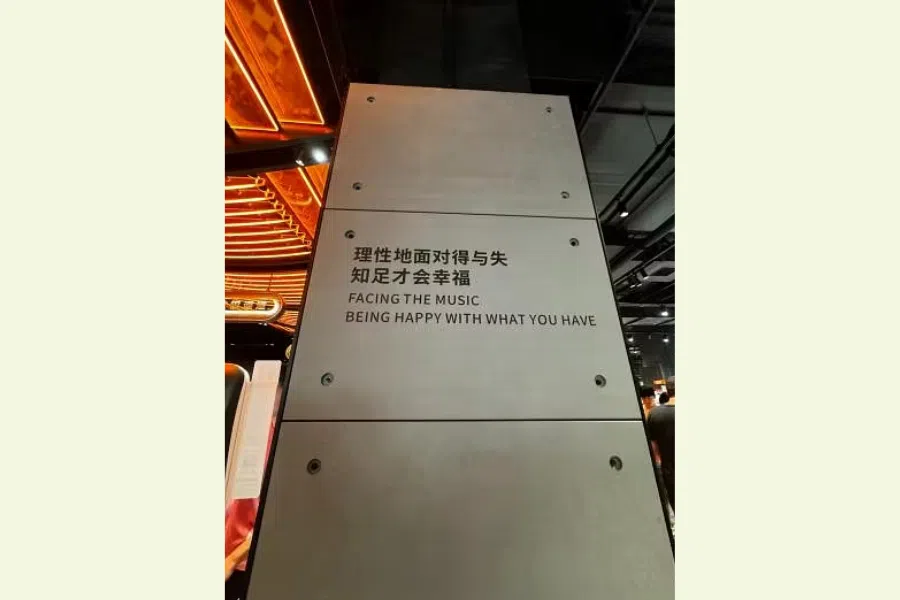
Yu rarely gives interviews to the media, but his works can be found at every Pang Dong Lai store: two volumes of Walk on Faith and Road of Goodness. Instead of teaching his business methods, Yu is akin to a preacher giving a sermon about his various beliefs in life.
Yu thoroughly explained the concept of “freedom and love” in corporate culture. He said, “Freedom and love is a system developed through continuous exploration, combining elements of classic Western culture, modern industrial civilisation, and China’s Confucianism, Buddhism and Taoism. This system ensures that employees feel dignified, joyful and free, fostering a passion for work and life.”
The walls of Pang Dong Lai’s stores and supermarkets are filled with Yu’s life philosophies. For example, “Facing the music; being happy with what you have”, “We are emissaries of beauty; love and kindness will be our greatest faith”, and “Use rational means to transform servitude and shape attitude”.
If not for the bustling crowd, you might mistakenly think that you are joining a care or religious organisation when you walk into Pang Dong Lai.
Yu has incorporated his life into how he runs his business — while the theories are simple, they’re not for everyone. The Caijing article reported that a CEO of a Chinese supermarket chain once summed up that “if what Yu did turned out well, it’s ‘the work of God’. If what he did turned out badly, it would be ‘the work of a lunatic’”. “Divinity” and “lunacy” seem to be two sides of the same coin.
This article was first published in Lianhe Zaobao as “直擊河南胖東來火爆買氣 超市用愛與自由書寫消費奇蹟”.



![[Big read] When the Arctic opens, what happens to Singapore?](https://cassette.sphdigital.com.sg/image/thinkchina/da65edebca34645c711c55e83e9877109b3c53847ebb1305573974651df1d13a)
![[Video] George Yeo: America’s deep pain — and why China won’t colonise](https://cassette.sphdigital.com.sg/image/thinkchina/15083e45d96c12390bdea6af2daf19fd9fcd875aa44a0f92796f34e3dad561cc)
